新编大学英语 外研社 第二版 1 )情态动词选讲 (2)
新编大学英语(第二版)外研社Book2Unit3Part2B共49页

Part Two: After-Class Reading >> Passage I
3. List the things that Harlan tried and failed in. ● He tried odd jobs as a farmhand. ● He tried being a bus conductor. ● He joined the army. ● He tried blacksmithing. ● He was a railroad locomotive fireman. ● He studied law by correspondence. ● He sold insurance. ● He sold tires. ● He ran a ferryboat. ● He ran a filling station. ● He was chief cook and bottle washer at a restaurant.
Part Two: After-Class Reading >> Passage I
Words and Expressions
•odd >>
•conductor >>
•figure >>
•a succession of >>
•correspondence>> •lifespan >>
•run out >>
•explode >>
Part Two: After-Class Reading >> Passage I
odd adj.
1. strange and unusual 奇怪的;不寻常的;古怪的 ● She had the oddest feeling that he was avoiding her.
新编大学英语第二册1-7单元课文翻译及课后答案
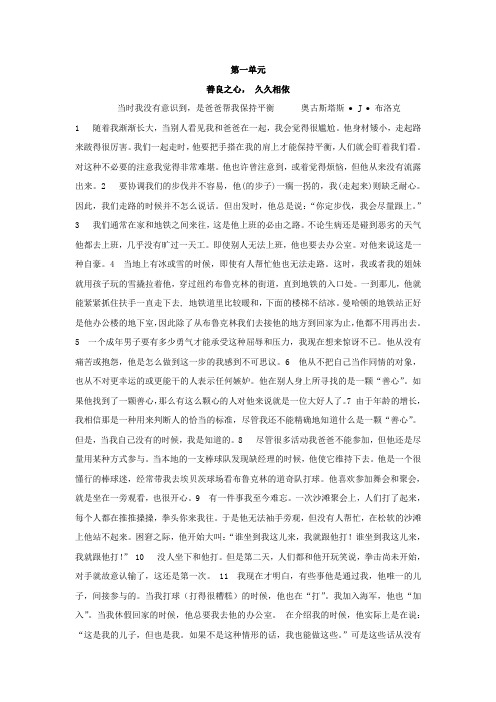
第一单元善良之心,久久相依当时我没有意识到,是爸爸帮我保持平衡奥古斯塔斯• J •布洛克1 随着我渐渐长大,当别人看见我和爸爸在一起,我会觉得很尴尬。
他身材矮小,走起路来跛得很厉害。
我们一起走时,他要把手搭在我的肩上才能保持平衡,人们就会盯着我们看。
对这种不必要的注意我觉得非常难堪。
他也许曾注意到,或着觉得烦恼,但他从来没有流露出来。
2 要协调我们的步伐并不容易,他(的步子)一瘸一拐的,我(走起来)则缺乏耐心。
因此,我们走路的时候并不怎么说话。
但出发时,他总是说:“你定步伐,我会尽量跟上。
”3 我们通常在家和地铁之间来往,这是他上班的必由之路。
不论生病还是碰到恶劣的天气他都去上班,几乎没有旷过一天工。
即使别人无法上班,他也要去办公室。
对他来说这是一种自豪。
4 当地上有冰或雪的时候,即使有人帮忙他也无法走路。
这时,我或者我的姐妹就用孩子玩的雪撬拉着他,穿过纽约布鲁克林的街道,直到地铁的入口处。
一到那儿,他就能紧紧抓住扶手一直走下去, 地铁道里比较暖和,下面的楼梯不结冰。
曼哈顿的地铁站正好是他办公楼的地下室,因此除了从布鲁克林我们去接他的地方到回家为止,他都不用再出去。
5 一个成年男子要有多少勇气才能承受这种屈辱和压力,我现在想来惊讶不已。
他从没有痛苦或抱怨,他是怎么做到这一步的我感到不可思议。
6 他从不把自己当作同情的对象,也从不对更幸运的或更能干的人表示任何嫉妒。
他在别人身上所寻找的是一颗“善心”。
如果他找到了一颗善心,那么有这么颗心的人对他来说就是一位大好人了。
7 由于年龄的增长,我相信那是一种用来判断人的恰当的标准,尽管我还不能精确地知道什么是一颗“善心”。
但是,当我自己没有的时候,我是知道的。
8 尽管很多活动我爸爸不能参加,但他还是尽量用某种方式参与。
当本地的一支棒球队发现缺经理的时候,他使它维持下去。
他是一个很懂行的棒球迷,经常带我去埃贝茨球场看布鲁克林的道奇队打球。
他喜欢参加舞会和聚会,就是坐在一旁观看,也很开心。
新编大学英语(第二版)外研社Book2Unit3Part2B49页

•explode >>
Part Two: After-Class Reading >> Passage I
odd adj.
1. strange and unusual 奇怪的;不寻常的;古怪的 ● She had the oddest feeling that he was avoiding her.
To be continued
Part Two: After-Class Reading >> Passage I
3. List the things that Harlan tried and failed in. ● He tried odd jobs as a farmhand. ● He tried being a bus conductor. ● He joined the army. ● He tried blacksmithing. ● He was a railroad locomotive fireman. ● He studied law by correspondence. ● He sold insurance. ● He sold tires. ● He ran a ferryboat. ● He ran a filling station. ● He was chief cook and bottle washer at a restaurant.
Passage I
Better Late than Never
Passage Comprehension Words and Expressions Key Sentences
Main Points
Part Two: After-Class Reading >> Passage I
新编大学英语视听说教程2第二版教学大纲
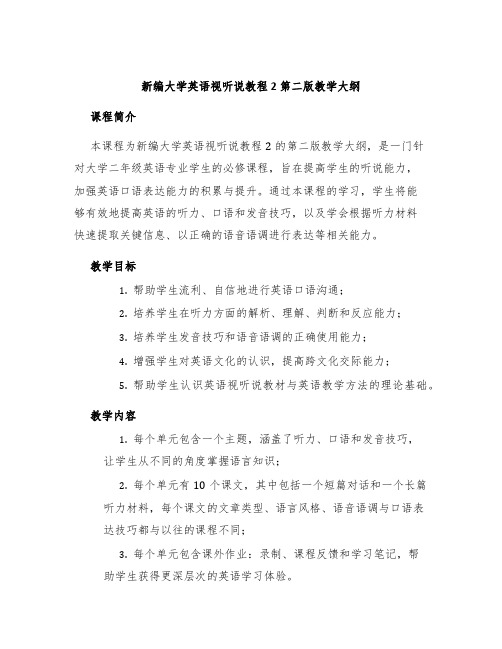
新编大学英语视听说教程2第二版教学大纲课程简介本课程为新编大学英语视听说教程2的第二版教学大纲,是一门针对大学二年级英语专业学生的必修课程,旨在提高学生的听说能力,加强英语口语表达能力的积累与提升。
通过本课程的学习,学生将能够有效地提高英语的听力、口语和发音技巧,以及学会根据听力材料快速提取关键信息、以正确的语音语调进行表达等相关能力。
教学目标1.帮助学生流利、自信地进行英语口语沟通;2.培养学生在听力方面的解析、理解、判断和反应能力;3.培养学生发音技巧和语音语调的正确使用能力;4.增强学生对英语文化的认识,提高跨文化交际能力;5.帮助学生认识英语视听说教材与英语教学方法的理论基础。
教学内容1.每个单元包含一个主题,涵盖了听力、口语和发音技巧,让学生从不同的角度掌握语言知识;2.每个单元有10个课文,其中包括一个短篇对话和一个长篇听力材料,每个课文的文章类型、语言风格、语音语调与口语表达技巧都与以往的课程不同;3.每个单元包含课外作业:录制、课程反馈和学习笔记,帮助学生获得更深层次的英语学习体验。
教学方法1.授课方式:课堂教学和网络课堂教学相结合,提供个性化的学习体验;2.学习方式:以听力和口语为主,支持多样化、实用性的口语学习方式,例如仿读、演讲、互动式学习等;3.评价方式:基于学习者的实际表现、反馈和课程达成度,采用形成性和协同性的评价方式,评价学生的学习过程和学习成果。
课程安排第一单元:电影与电视剧•课程目标:通过电影和电视剧了解英美文化和训练听力技巧。
•课程时间:4周。
•课程内容:1.了解电影和电视剧的历史和文化地位;2.学习如何进行电影和电视剧的文化分析;3.训练如何听取英语对话和剧情的信息;4.学习如何进行剧本阅读和朗读。
第二单元:新闻与事件•课程目标:通过新闻和事件了解英美文化和训练听力技巧。
•课程时间:3周。
•课程内容:1.了解新闻的类型和特点;2.学习如何写新闻稿和翻译新闻;3.训练如何听取新闻和事件的信息。
新编大学英语(第二版)外研社Book2Unit1Part 4PPT课件

To be continued
3) 支付他孩子的教育费用
pay for his children’s education
To be continued
8
Part Four: Writing and Translation>>Translation
4) 经过多年的辛勤研究之后 after years of diligent research
作为晚间护土,每天下午我值勤的时候, 都要走过养老院的过道,在每个门口停下 来看一看,聊一聊。
4
To be continued
Part Four: Writing and Translation>>Translation
英
省 略 代 词 和 冠 词
译 汉 省 略 译 法 ( 1
)
二、省略冠词 英语里有冠词, 而汉语里则没有。因此,翻译时往
水结冰时由液体变成固体。
4) Even brushing or patting a dog is great physical therapy, and we all know the benefits of walking, which is something a dog needs too.
甚至给狗梳梳毛或者轻轻地拍拍它,都是很好的理疗, 而且我们都知道散步的好处,这也是狗所需要的。
他喜欢参加舞会和聚会,就是坐在一旁观 看,也很开心。
新编大学英语(第二版)第二册课后答案
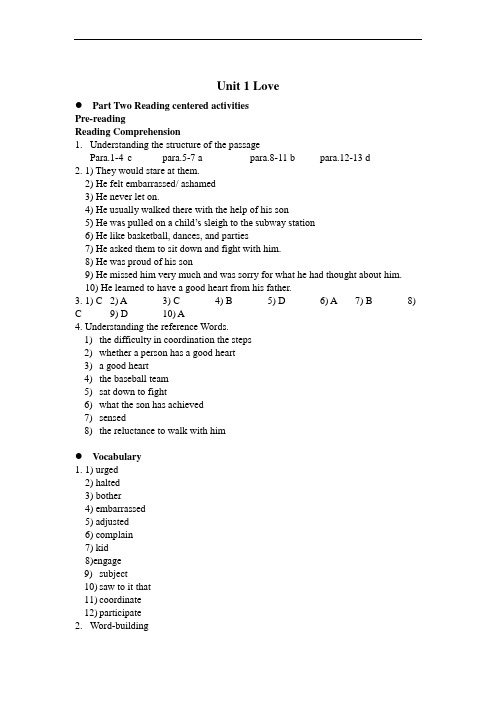
Unit 1 Love●Part Two Reading centered activitiesPre-readingReading Comprehension1.Understanding the structure of the passagePara.1-4 c para.5-7 a para.8-11 b para.12-13 d2. 1) They would stare at them.2) He felt embarrassed/ ashamed3) He never let on.4) He usually walked there with the help of his son5) He was pulled on a child’s sleigh to the subway station6) He like basketball, dances, and parties7) He asked them to sit down and fight with him.8) He was proud of his son9) He missed him very much and was sorry for what he had thought about him.10) He learned to have a good heart from his father.3. 1) C 2) A 3) C 4) B 5) D 6) A 7) B 8)C 9)D 10) A4. Understanding the reference Words.1)the difficulty in coordination the steps2)whether a person has a good heart3) a good heart4)the baseball team5)sat down to fight6)what the son has achieved7)sensed8)the reluctance to walk with him●Vocabulary1. 1) urged2) halted3) bother4) embarrassed5) adjusted6) complain7) kid8)engage9)subject10)saw to it that11)coordinate12)participate2.Word-buildingpatiencebitternessfortuneknowledgeablereluctantentrancecomplaintenviousmemorablefrustration1)bitter2)fortunate3)patience4)memorable5)reluctant6)entrance7)complaints8)envious9)knowledgeable10)frustration●Translation1.He walks slowly because of his bad leg.2.He came to the meeting despite his serious illness.3.He saw to it that the same mistake didn’t happen again.4.Now that they’ve got to know each other a little better, the get along just fine.5.Then I found myself surrounded by half a dozen boys.6.I send you my best wishes on this happy occasion.●Part Three Further development3.What is love?1)causes2)offers3)to4)not5)tell6)calls7)attracted8)discovers9)weak10)disappointed11)distance12)out●Part Four Writing and Translation2. Translation Practice1.From Chinese into English1)support a big family2)care for her children and parents3)pay for his children’s education4)after years of diligent research5)the financial burden on his shoulders6)She has a golden heart/ a heart of gold and loves people around her.7)My father has never bought any toys and candies for my younger brother andme, but I know he loves us.8)My parents do their best to meet our needs and always keep their promises. 2.From English into Chinese1)他从来不感到疲劳,非常喜欢干活,而且说话不多。
外研社英语必修1,2期末复习知识点讲解.doc

必修一、二知识点总结必彳—Module 1重点短语:not far from 离 .. 不远write down my thoughts about it 写下.... 的想法informationfrom websites 网上的消息iave fun 玩的高兴give instructions 给出扌旨示in a fun way以一种有趣的方式write a desciption of 写下.... 的描述in other words换句话说have / make an impression on /upon sb. 给某人留下£卩象take place 发生take part in 参加Iby oneself 独自at first / the end of / the start of 起先/ 在结束时/ 在 ..... 开始时nothing like与……不同;没有……能比得上固定搭配be different from 与 .. 不同differences beween/ among ...... 的差异introduce...to...把.... 介绍.look toward to doing sth./ sth.期望做.... / 期望.be impressed with/ by 被.... 所吸弓Iimpress sb. with sth. = impress sth.on /upon sb. 使某人铭i己某事be simliar to 与.. 相似be divided into 被分成...be separated from 被和 .. 分开mind doing sth.介意做...固定句型1.In other word, there are three times as many girls as boys.倍数表达法:%1A+be/ \Z + 倍数 + as +adj./adv.原级 + as + B%1A+be/ \Z + 倍数+ adj./adv.比较级+than + B%1A+be / V + 倍数+ the (size,weight,height,width,depth,lengh) + of + B2.Would you mind if I did ...?介意我做.. ?3.The teacher is a very enthusiastic woman called Ms.Shen.called Ms. Shen是过去分词作短语定语,修饰woman.与修饰词之间是被动关系。
新编大学英语(第二版)外研社Book2Unit4Part-2A市公开课获奖课件省名师示范课获奖课件

Part Two: In-Class Reading >>Global Reading
Sample 2
I usually avoid going to the hospital because to see a doctor is really tiring and time-consuming. So when I don’t feel well and it’s not a very serious case, what I usually do is to have a good rest. For example, when I have a cold, I will drink a lot of water and stay in bed. If it’s a serious health problem and I can’t recover by taking a good rest, I’ll go to the doctor and get some medicine. Just like most people, I hope the doctor will comfort me besides prescribing me the medicine.
“Yes”, “No” or “Maybe” in the space provided.
Yes No
Maybe
means it is true.
means it is false. means there is not enough information in the article to know whether it is true or
♣ It focuses on specific steps a patient can take to
新编大学英语教材第二版

新编大学英语教材第二版大学英语是许多学生必修的课程之一,而新编大学英语教材第二版作为一本备受欢迎的教材,对于学生学习英语具有重要的意义。
本文将对新编大学英语教材第二版的特点、优势以及学习方法进行探讨,旨在帮助广大学生更好地利用这本教材提升英语水平。
一、新编大学英语教材第二版的特点新编大学英语教材第二版在编写过程中充分考虑学生的实际需求以及现代教育理念,具有以下几个显著特点:1. 高度适应性:教材内容的难易程度经过精心设计,能够满足不同水平的学生的需求。
从基础语法到高级写作,都能找到适合自己的内容。
2. 实用性强:教材注重培养学生的语言运用能力,因此大量的例句和语法练习使得学生能够更好地理解和应用所学知识。
3. 知识体系完善:教材内容覆盖了英语的各个方面,从听说读写到语法翻译,既有基础知识的讲解,也有高级技巧的指导,使学生能够全面提高自己的英语能力。
二、新编大学英语教材第二版的优势相比于其他英语教材,新编大学英语教材第二版具有一系列优势,使其成为学生首选的教材之一。
1. 现代教育理念的贯彻:教材注重培养学生的思维能力和创新意识,采用了一些与学生生活相关的话题,激发学生的学习兴趣。
2. 多媒体辅助学习:教材配套的多媒体教学资源丰富多样,包括听力材料、录音资料等,方便学生在课堂和自习中进行系统的学习。
3. 多样化的练习形式:教材中提供了丰富多样的练习形式,如听力填空,阅读理解,口语对话等,能够全面锻炼学生的语言应用能力。
三、学习新编大学英语教材第二版的方法学习一门课程关键在于方法,下面提供几种学习新编大学英语教材第二版的方法,供学生参考。
1. 预习:在开始新课前,可以先浏览一遍教材内容,了解大致内容和重点所在,有助于听课时更好地理解和吸收知识。
2. 多听多读多练:新编大学英语教材第二版强调语言的实际运用,因此要多听多读多练,能够提高听力和口语表达的能力。
3. 注重语法学习:语法是英语学习的基础,所以要重视语法的学习,适当背诵一些语法规则并进行相关的习题训练。
新编大学英语(第二版)外研社Book2Unit6Part1

Part One: Preparation >> Check Your Vocabulary
kiwi fruit
papaw/papaya
carambola
Do you know the names of these fruits?
persimmon
mango durian
fig
lemon
Part One: Preparation >> Check Your Vocabulary
onion
bell pepper
Chinese cabbage
vegetables
carrot
Chinese leek
mushroom
eggplant
potato
Part One: Preparation >> Check Your Vocabulary
cabbage
pumpkin
lotus root
3. Which of the following is most fattening? A. brown bread B. boiled potato C. ___ salted peanuts
Part One: Preparation >> Speaking Activities
4. Which of the following do we get a lot of vitamins from? A. cereal B. meat ___ fruit and vegetables C. 5. People often damage their health by eating too much ____. A. breakfast cereal ___ fatty food B. C. frozen vegetables
新编大学英语第二版第一册Unit2教参

Unit 2 Remembering and ForgettingUseful InformationMemory is one of the most important functions of human intelligence, which makes it possible for people to learn and become educated, to learn skills necessary for work and play, and to form emotional ties to the past. Memory is important, because if we cannot learn from our successes and failures of the past we are more likely to repeat our errors and not benefit from our successes.We do not know everything about memory and how it functions, but we know much more than we did even ten years ago, and more information regarding memory and the function of the brain is being discovered every day. If the current approaches to understanding memory and intelligence are as successful as specialists in these areas think they will be, we should all understand our memories better and we may be able to treat some of the problems which arise with forgetting and memory failure in aging and memory impaired persons.Memory is especially important in cultures which value their heritage and honor their ancestors and families by celebrating what these individuals and groups gave. If we are to have pride in our ethnic associations, we must remember the values and teachings of the past on which our cultures have been founded. This has often been the basis for either philosophical or religious teachings. In the West people often learn, “Honor your fath er and your mother so that you may lead a long and happy life in the land which your Lord God has given you.” The American Indians who lived in North and South America long before people from Europe and elsewhere came to these areas have similar teachings which honor their ancestors. Asian cultures have similar teachings in both their religious and philosophical heritage—the very word HERITAGE refers specifically to something acquired or inherited from a predecessor.Whether we celebrate our heritage by sweeping the tombs of our ancestors, acknowledging the importance of ancestors in our culture, or sharing with others in remembering and giving thanks for those who have come before us, most people feel this is a powerful binding force which holds societies and nations together. Many Western holidays such as Christmas (honoring the birth of Jesus Christ), Thanksgiving (honoring those who have provided food and shelter), or Memorial Day (honoring those who have lost their lives in the defense of the nation) are important for the reason that we must not forget those who have helped us become what we are as a culture, a community, anation, etc. Again this can be compared to China’s family-oriented holidays, (the Harvest Festival, New Year’s Celebration, etc.).Memory and forgetting are not always without pain. All of us have memories of being punished by our parents or teachers when we behaved badly or disobeyed some rules of our family or school. As we look back, we know that these punishments were necessary in order to learn that we must abide by the rules of our family and culture. Without the discipline of “law” (rules), there can be no stable civilization. All of us have been unhappy when we have forgotten important things such as a parent’s or friend’s birthd ay; or we may have forgotten to do our homework, or failed to keep an appointment with a friend.Finally, if it were not for memory, think of the loss of pleasure we would have in remembering the joys of youth, first love, and the joy of learning itself. Memory is more characteristic of humans than of any other animals. Without it we would all lead dull, colorless lives, prone to repeating our mistakes and failing to learn from experience.Part One Preparation1. Expressions Related to MemorySTEP ONEIf a word, expression, etc. is on the tip of your tongue, you usually know it but have difficulty remembering it at that moment. 就在嘴边的,差一点就能够想起的When you say someone’s head is like a sieve or someone has a memory like a sieve, you mean that they forget things very easily. 记性坏,健忘If your mind goes blank or has gone blank, you are suddenly not able to remember a fact or piece of information at a time when you need it. 头脑一片空白If a piece of information goes in one ear and out the other, it is heard but either ignored or quickly forgotten. 一只耳朵进一只耳朵出,看成耳边风STEP TWO1) b 2) d 3) a 4) c2. Do You Have a Good Memory?STEP TWOSampleI got 16 in this quiz. According to the result, I have a good memory. But I can say I’m extremely good at remembering facts and figures for exams, birthdays, telephone numbers, etc., but I have a poor memory in remembering things like what I had for dinner, what I was wearing, etc.I think a person can remember what they need and want to remember. In other words, one’s purpose and motivation make it possible for them to recall facts. They may find it difficult to remember facts about the geography of a country that doesn't interest them, but can easily remember things about the country they’re going to visit next summer. Why? Because they are motivated and motivation helps them to concentrate. Increased concentration, in turn, makes the information easier to remember.To sum up, one’s purpose decides what to look for and remember, and therefore directs their attention to what they want to know.STEP THREESample 1Yes, I once had a very embarrassing experience. One day, when I was walking on the street, I saw a young lady nodding and smiling at me and I began to wonder who she was. When she approached, she asked me about my college life in the past two weeks. Though I didn’t know whom I was talking to, I told her everything, including the fact that I could seldom see my advisor and had no one to turn to for help. An odd grimace crossed her mouth and she looked a little bit embarrassed. Then she gave me a phone number along with her name. It was then that I realized she was actually my advisor.Sample 2Well, I think all of us have been embarrassed when we have forgotten some important things such as a friend’s birthday and an appointment. I had such an experience about one year ago. One of my friends, Grace, invited me to her home on the following Saturday, and I promised I would be there on time. When I arrived, I saw some of our classmates were there and each of them had brought a present for Grace. It turned out that that day was her birthday. I felt veryembarrassed, but I thought I had to do something to cover up my embarrassment. So, I went up to her and said, “Go sh, Grace, you never seem to age, so I never remember your birthday.”3. How to remember clearly?STEP ONEIn picture 1, the man is forming a mental picture of the things he wants to buy.In picture 2, the man is repeating the things he wants to buy.In picture 3, the man is trying to remember his shopping list by inventing a story.In picture 4, the man is forming meaningful connections between the things he wants to buy and the letters in the word “CANDY”.STEP TWOSample 1When I’m trying to memorize facts for exams, I always repeat them a number of times. The more I do this, the easier it is to remember. Even so, I think, repetition, by itself, is not enough, Sometimes, I must do something with what I am trying to remember and engage with the material. I will ask questions, think about the topic in relation to my own experience, put theories into my own words, or discuss issues with my classmates.Sample 2Sometimes I use the method of forming meaningful connections to remember English words. For example, when trying to remember whether I should use the word "principle" or "principal", I tell myself that a principle is a rule and a principal is my pal and then I can use the appropriate word. Besides, I keep a diary to record my memories. When I go to new places, I buy souvenirs or take photographs to remind me of the places and people there. Sometimes songs help me remember things, too. For example, “Yesterday Once More” was my favorite song in high school. Now the song always brings back pleasant memories of my high school life.Sample 3Apart from the methods mentioned in the pictures, I will use the method of “chunking”to memorize numbers. I find it’s a good way because chunking involves grouping materials togetherrather than learning each item separately. For example, when my friend told me his telephone number is 0678, I grouped the 12 numbers into three chunks, "0571"; "8820"; "4678", it was far easier to remember.4. Testing Your MemoryThe following three groups of numbers, words and phrases are for your reference:Group One: , , ,agent, accurate, delivery, identify, vanish, view, establish, location,airline ticket counter, head for, in sight, fill out, a claim form, in detail,Group Two: , , ,claim, display, elementary, grocery, specific, exclaim, amount, benefitdepend on, long-term memory, show off, at times, better off, let aloneGroup Three: , , ,conclude, exclaim, luggage, involve, function, specific, establish, locationremind…of…, recall the facts, make decisions, on…basis, make great progress,form mental picturesPart Two Reading-Centered ActivitiesIn-Class ReadingI. Pre-ReadingSTEP ONESTEP TWO1) check-in counter 2) conveyor belt 3) loading area 4) claim check 5) boarding pass6) security checksII. Passage ReadingWords, Phrases and Grammatical Points1. flight (l. 1)The word “flight” has several meanings:1) a journey on an airplane, etc.. I) Our flight from Chicago to Seattle was pleasant.II) The captain and crew hope that you have enjoyed the flight.2) an airplane that takes you on a particular journey.I) I’m sorry, this flight is full. I can put you on the 4:30 plane.II) Can you tell me what time Flight No. 340 arrives in New York?3) the action of flying.I) It’s unusual to see swans in flight.II) Certain birds spend most of the day in flight.4) a number of stairs or steps leading up or down.I) The women’s dress d epartment is one flight up.II) She sounded as though she had just run up two flights of stairs.2. As I was walking by the shops, I happened to see a display of flight bags, which reminded me of my briefcase. (l. 5~6)句中which引导非限制性定语从句。
新编大学英语(第二版)外研社Book2Unit2Part 3
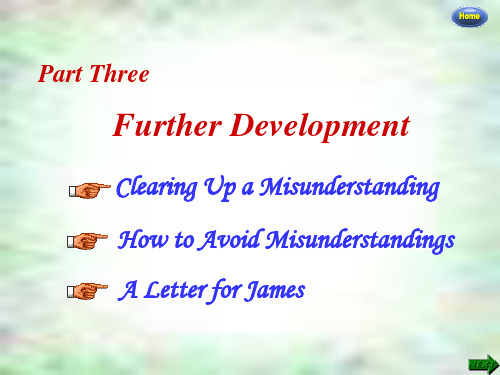
Further Development
Clearing Up a Misunderstanding How to Avoid Misunderstandings A Letter for James
Part Three: Further Development >> Clearing Up a rther Development >> Clearing Up a Misunderstanding
use feedback to show agreement and disagreement. When John heard Laura’s “um”, “un huh,” and “yes”, he thought that she was agreeing with him. However, according to the feminine culture, she was only showing interest and being responsive to him. She was not signaling agreement.
Question: What caused the communication problem between John and Laura?
Words and Phrases: masculine and feminine culture 男性和女性文化 response 反应 feedback 反馈 responsive 积极回应的
—Pay attention to similar-sounding words or words which are pronounced the same but spelled differently in conversation. When you say any word of the kind, make sure your listeners hear the word you actually said or meant. If you’re a listener, try to make sure what you heard is really what the speaker had said.
新编大学英语第二版
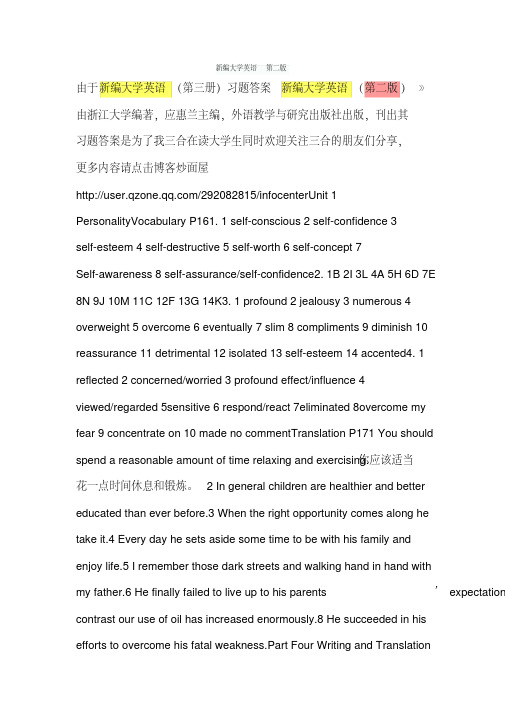
新编大学英语第二版由于新编大学英语(第三册)习题答案新编大学英语(第二版)》由浙江大学编著,应惠兰主编,外语教学与研究出版社出版,刊出其习题答案是为了我三合在读大学生同时欢迎关注三合的朋友们分享,更多内容请点击博客炒面屋/292082815/infocenterUnit 1PersonalityVocabulary P161. 1 self-conscious 2 self-confidence 3self-esteem 4 self-destructive 5 self-worth 6 self-concept 7Self-awareness 8 self-assurance/self-confidence2. 1B 2I 3L 4A 5H 6D 7E8N 9J 10M 11C 12F 13G 14K3. 1 profound 2 jealousy 3 numerous 4overweight 5 overcome 6 eventually 7 slim 8 compliments 9 diminish 10reassurance 11 detrimental 12 isolated 13 self-esteem 14 accented4. 1reflected 2 concerned/worried 3 profound effect/influence 4viewed/regarded 5sensitive 6 respond/react 7eliminated 8overcome myfear 9 concentrate on 10 made no commentTranslation P171 You shouldspend a reasonable amount of time relaxing and exercising.你应该适当花一点时间休息和锻炼。
2 In general children are healthier and bettereducated than ever before.3 When the right opportunity comes along hetake it.4 Every day he sets aside some time to be with his family andenjoy life.5 I remember those dark streets and walking hand in hand withmy father.6 He finally failed to live up to his parents’ expectation contrast our use of oil has increased enormously.8 He succeeded in hisefforts to overcome his fatal weakness.Part Four Writing and Translation。
Unit 2 Remembering and Forgetting新编大学英语第二版第一册课文翻译
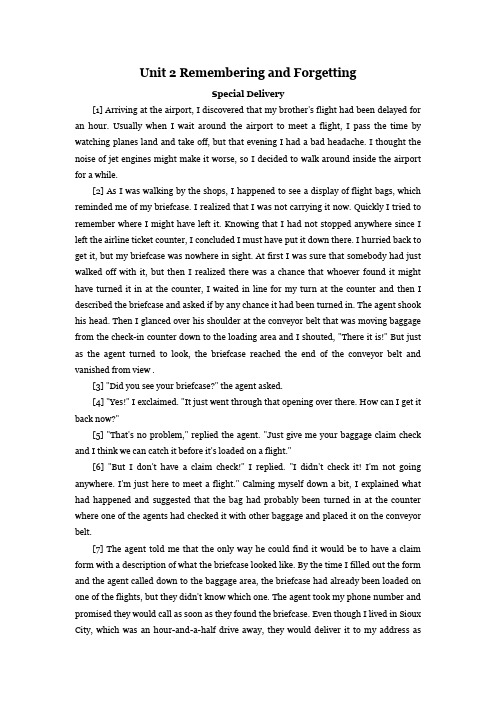
Unit 2 Remembering and ForgettingSpecial Delivery[1] Arriving at the airport, I discovered that my brother's flight had been delayed for an hour. Usually when I wait around the airport to meet a flight, I pass the time by watching planes land and take off, but that evening I had a bad headache. I thought the noise of jet engines might make it worse, so I decided to walk around inside the airport for a while.[2] As I was walking by the shops, I happened to see a display of flight bags, which reminded me of my briefcase. I realized that I was not carrying it now. Quickly I tried to remember where I might have left it. Knowing that I had not stopped anywhere since I left the airline ticket counter, I concluded I must have put it down there. I hurried back to get it, but my briefcase was nowhere in sight. At first I was sure that somebody had just walked off with it, but then I realized there was a chance that whoever found it might have turned it in at the counter, I waited in line for my turn at the counter and then I described the briefcase and asked if by any chance it had been turned in. The agent shook his head. Then I glanced over his shoulder at the conveyor belt that was moving baggage from the check-in counter down to the loading area and I shouted, "There it is!" But just as the agent turned to look, the briefcase reached the end of the conveyor belt and vanished from view .[3] "Did you see your briefcase?" the agent asked.[4] "Yes!" I exclaimed. "It just went through that opening over there. How can I get it back now?"[5] "That's no problem," replied the agent. "Just give me your baggage claim check and I think we can catch it before it's loaded on a flight."[6] "But I don't have a claim check!" I replied. "I didn't check it! I'm not going anywhere. I'm just here to meet a flight." Calming myself down a bit, I explained what had happened and suggested that the bag had probably been turned in at the counter where one of the agents had checked it with other baggage and placed it on the conveyor belt.[7] The agent told me that the only way he could find it would be to have a claim form with a description of what the briefcase looked like. By the time I filled out the form and the agent called down to the baggage area, the briefcase had already been loaded on one of the flights, but they didn't know which one. The agent took my phone number and promised they would call as soon as they found the briefcase. Even though I lived in Sioux City, which was an hour-and-a-half drive away, they would deliver it to my address assoon as they got it back.[8] My brother's flight arrived and, after getting his suitcases, we headed for my car in the parking lot. During the drive home I told him all about the briefcase. When we got home and were unloading the car, I could hardly believe my eyes when my brother took a briefcase out of the car. The briefcase I thought I had lost had never been taken into the airport! It had been on the floor in the back seat. I realized that at that moment the airline people were checking each piece of baggage on their Denver, St. Louis and Chicago flights, looking for my briefcase. The thought of having to call and tell them I had found it in my car was painful.[9] As we walked in the house the telephone was ringing. Answering it, I was shocked when an airline worker said, "We have good news for you! We found your briefcase in Denver. It should be here by eleven o'clock and will be delivered to you shortly after midnight."特种快递1 到了机场才发现我兄弟达成的班机延误了一小时。
新编大学英语教案(第二册)_Unit 2 Communication Problems

Unit TwoCommunication problemsT eaching Objectives1. Let the students have some ideas of the common ways we usually use in our daily life to communicate.2. Make the students find the efficient ways to communicate with each other.3. Let the students come up with the ways to avoid misunderstandings.T eaching allotmentsix academic hoursFocus points1.key words and phrasesassume, conflict, convey, emphasis, ignore, misinterpret, react, verge, feel like, for effect, on the verge of, pull out, take----lightly2.difficult sentences1) When Martians and V enusians first got together, they encountered many of the problems with relationships we have today.2) So when communication problems emerged, they assumed it was just one of those expected misunderstandings and that with a little assistance they would surely understand each other.3) To fully express their feelings, women would tend to exaggerate the facts a little bit for effect and use various superlatives, metaphors, and generalizations.3.grammar focusprefix “mis---”的不同意义Related InformationIt is well-known that learning a second language is never easy, and, generally speaking, the older one is when one attempts a new language, the more difficult it becomes. This is at least partly due to what is known as language interference, meaning that the linguistic patterns of our first language interfere with those of the second because no two languages have exactly the same sounds and grammatical structures. The English language has a very large vocabulary because it has incorporated words from many other languages over the centuries. This is nowhere more apparent than in its color words. For example, there are many words that express the color “purple”, describing its different shades and hues: mauve, violet, lilac, or lavender. An interesting linguistic gender difference among native speakers of English is the likelihood of women using these color terms to differentiate between shades of purple, whereas, men will be satisfied with the one word “purple”. This is true of other color words too.Basing on what mentioned above, when learning a language, we sometimes need to pay attention to which sex uses which words, particularly when we reach an advanced stage where we are adding many new words to our vocabulary and want to use them accurately. We also need to pay attention to some of the multiple meanings that words have, as well as to their connotations.Suggested Class Activities1. Warming-up activity: How to communicate efficientlyPurpose: Inform the students the efficient way to communicate with each otherStep 1Discuss in groups about the common ways we usually use in our daily life to communicate and try to list both their advantages and disadvantages.Step 2 Make a comparison between them and decide which is the most efficient way for us to communicate with others.Step 3Ask some of the students to give their ideas in public and point out the necessary points they should know in daily communication.Suggested words/expressions:admirable/neglect/comprehend/over-crowded/distinguish----from/hold back/in a different light/turn out.2. In-class reading activity: What can we get from communicationPurpose: Inform the students the good points of communicationStep 1.Discuss in groups why we need to communicate with othersStep 2. Try to analyze what communication has brought to usStep 3.Then make sure what we should learn from communicating with othersSuggested words/expressions:foreigner/uncommon/feel like/for effect/on the verge of/pull outFurther development:How to avoid misunderstandings in communicationAfter reading this unit, we may know that in our communications misunderstandings are quite common, so work in groups to come up with the ways to avoid misunderstandings and make it on your exercise book.In-Class ReadingWords and phrases1.assume v.1) believe something is true without definite proofe.g. Y ou assumed his innocence / him to be innocent /that hi is innocent before hearingthe evidence against him.He is not such a fool as you assumed him to be.assuming that---:假定----e.g. Assuming that you are right about this, what shall we do?2) to take up or undertakee.g. Y ou will assume your new responsibilities tomorrow.assumption : n. sth. taken for granted ; sth. supposed but not provede.g. Don’t rely on the information she gave you---it’s pure assumption on her part.on the assumption that----以---为设想根据e.g. Let’s work on the assumption that our proposal will be accepted.Exercise:1) 他并非如你所以为的那样愚蠢。
- 1、下载文档前请自行甄别文档内容的完整性,平台不提供额外的编辑、内容补充、找答案等附加服务。
- 2、"仅部分预览"的文档,不可在线预览部分如存在完整性等问题,可反馈申请退款(可完整预览的文档不适用该条件!)。
- 3、如文档侵犯您的权益,请联系客服反馈,我们会尽快为您处理(人工客服工作时间:9:00-18:30)。
3’ In other respects:在其他方面: 例:an otherwise logical mind.在 其他方面才有逻辑的头脑 2)adj. 1’ Other than supposed; different: 不同的,意料之外的:并非如 同假定的;另外的: 例:The evidence is otherwise.证 据显示的是另外一回事
3)otherwise的虚拟 对与过去相反的事虚拟时,表示要 不然的话 例:He reminded of what I otherwise would have forgotten。 他提醒了我应该会忘的事(如果 他不提醒我,我就会忘了,现在 他提醒了我,我没忘)。
THE END
2010.11.20
5’疯狂的,狂怒的 The boss was wild with me for being late again. 老板因我再次迟到而大为恼怒。 6’荒唐的,离奇的,古怪的(书上用法) 7’【口】极好的,愉快的 8’热衷的,急切的,渴望的be wild about… 2)n. 1’荒野,荒地[the S] 2’未开发的地方[the P] There are few schools in the wilds of that country. 该国的偏僻地区极少有学校。
5.as if 1)在look, seem 等系动词后引导表语从句。 等系动词后引导表语从句。 ) 例:She looks as if she were ten years younger. 她看起来好像年轻了十岁。 她看起来好像年轻了十岁。 2)引导方式状语从句。 )引导方式状语从句。 例:The child talked to us as if he were a grow-up.(虚拟 虚拟) 虚拟 3)as if 还可用于省略句中 ) 如果as 引导的从句是“主语+系动词” 如果 if 引导的从句是“主语+系动词”结 可省略主语和系动词,这样as 构,可省略主语和系动词,这样 if 后就 只剩下名词、不定式、形容词(短语)、 只剩下名词、不定式、形容词(短语)、 介词短语或分词。 介词短语或分词。 例:He acts as if (he was) a fool. ) . Tom raised his hands as if (he was going) ) to say something
2) n. 落下,下降;滴,滴剂 1’滴(几滴血) 例:He coughed up some drops of blood. 他咳出了 几滴血。 2’药片,滴剂 例:cough drop .<美>止咳 药片
3)近义词比较 drop, fall, sink 都表示“落下,下降”之 意。 drop: 指物体从一定高度落下。 fall: 与drop同义,指突然或猛 烈地降落,但fall也可指任 何下落,同高度或形式无 关。 sink: 指在空气或水中垂直下降、 下沉。
出来,没有加任何评论。
拓展:bare adj. 1)裸的 The child was bare to the waist. 2)光秃秃的 3)空的 4)无陈设的;无装饰的 5)不 加掩饰的 6)勉强的;仅仅的 All they had were the bare necessities of life. 7)没有...的 The little room was almost bare of furniture. vt. 1)使赤裸;露出 Their backs were bared. 他们的背裸着。 2)揭露;透露
2.Barely adv.. 1)仅仅,勉强;几乎没有 He has barely enough money to live on. 他的钱仅够勉强维持生计。 2)贫乏地;光秃秃地 The room was furnished barely but neatly.he facts are presented barely, without any comments.事实原原本本摆了
2’ drop off 脱落,让…下车,睡着;下 降,减少 例:I can drop you off at Normandy Ave. 我可以在诺曼蒂大街让您下车。 Yen dropped off. 日元下跌。 3’ drop out .不参与,离去,放弃 4’ drop back后退,后撤;恢复 例:The car dropped back halfway through the race
1’’如果从句表示与现在事实相反,谓语 动词用一般过去时。 例:You look as if you didn’ t care. 你看上去好像并不在乎。 2’’句表示与过去事实相反,谓语动词用 “had+过去分词”。 例:He talks about Rome as if he had been there before. 3”从句表示与将来事实相反,谓语动词用 “would/could/might+动词原形例: He opened his mouth as if he would say something. 他张开嘴好像要说什么。
6.wild 1)adj. 1’野的;野生的,未被人驯养的 Those are wild roses. 2’荒凉的,无人烟的 3’难驾驭的;任性的,无法无天的;粗野的 She is afraid of his wild looks. 她害怕他那粗野的神情。 4’猛烈的,狂风暴雨的 on a wild night 在一个狂风暴雨之夜
5’ drop by the wayside =fall by the wayside 迷入歧途,堕落,遭受失败 6’ drop 投寄,指比较随意投 例:. He dropped the letter into the mailbox.. 7’(因累,受伤,死亡等而)倒下 例:I will work till I drop.我要工作 我倒下为止。
4)as if 从句的语气及时态 1’ as if 从句用陈述语气的情况。 当说话者认为句子所述的是真实的或 极有可能发生或存在的事实时。 例:It sounds as if it is raining. 听起来像是在下雨。 2’as if 从句用虚拟语气的情况。 当说话人认为句子所述的是不真实的 或极少有可能发生或存在的情况时。 从句虚拟语气动词时态的形式如下:
3.let alone 更不用说 4.drag one’s feet拖拉,行动慢,拖 延不走, 迟迟不行动; 故意拖拉 例:1)The children wanted to watch TV, and dragged their feet when their mother told them to go to bed. 孩子们想看电视, 因此 当母亲叫他们去睡觉时, 都慢吞 吞地走。 2)The boy drags his feet in doing school work. 这男孩做功课拖拖 拉拉。
Unit1 passage2
学员旅七队 许乐 2010.11.20
1. drop by my home偶然拜访, 顺便拜 访 drop 1)v.过去式: dropped过去分词: dropped 现在分词: dropping 1’ drop by:顺便拜访(或降低了…) drop in:顺便走访 (drop in on/upon sb拜访某人 /drop in at sp到访某地) drop at spl.:顺路拜访某处
3)adv. 1’狂暴地;无法控制地 2’胡乱地 7.otherwise 1)adv. 1’In another way; differently 以另外的方式;不同地 例:She thought otherwise. 2’Under other circumstances 否则,不然:在另外的情况下; 例:Otherwise I might have helped.
